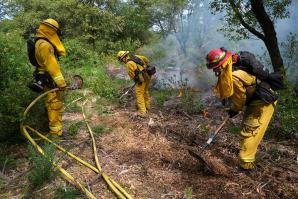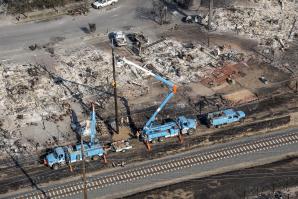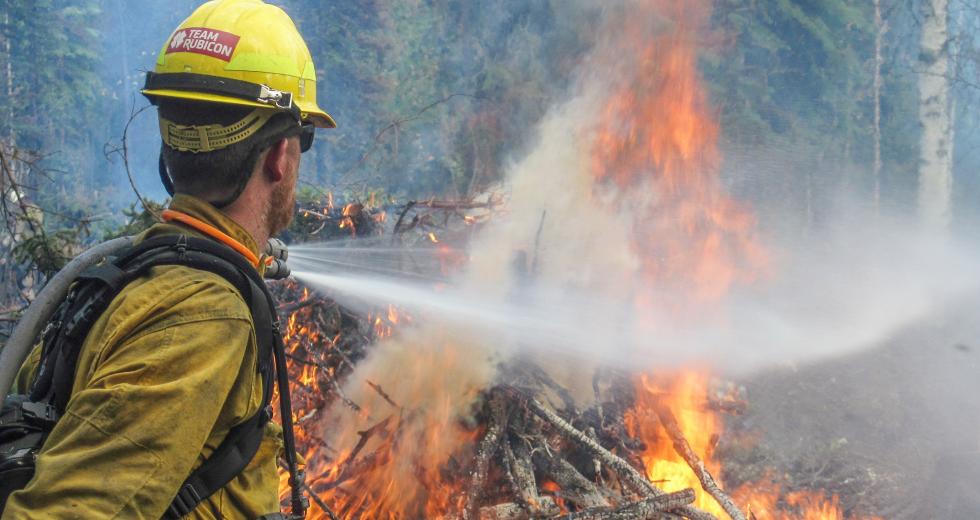The majority of Californians believe global warming is happening now and that it’s a serious threat to the Golden State’s future, according to the results of a poll released on Monday. What’s more, Californians are ready to cast their votes and spend their money to fight it.
The findings from the Public Policy Institute of California, a non-partisan think tank that’s asked Californians for their take on environmental issues for nearly two decades, suggest Californians place a high value on the environment and want the state to fight to protect it.
The Institute found 78 percent of Californians think it is somewhat to very important to them for California to lead the charge to fight climate change. The issue was especially key for Democrats, with 69 percent saying it was very important compared to 46 percent of Independents and 24 percent of Republicans.
That’s useful information from a political perspective, Ed Maibach, director of the George Mason University Center for Climate Change Communication, said in an email to CalMatters. “This will likely encourage Republican leaders to recognize that opposition to climate solutions may come at a steep cost during their next election,” said Maibach, who was not involved in the polling.
The latest survey of more than 1,700 Californian adults asked how they feel about everything from wildfires to coastal drilling to the candidates running for president.
The survey suggests recent catastrophic wildfires might have played a role in shaping public opinion. The majority — 63 percent — of Californians understand that global warming has played a part in the wildfires tearing through the state. More —71 percent — are very worried about a future of more severe wildfires as a consequence of climate change. Californians think the state’s future is at risk, with 79 percent calling climate change a somewhat or very serious threat to the state’s future economy and quality of life.
The wildfire results stood out to Mark Baldassare, president and chief executive officer of the Institute. “That to me was the most significant finding related to both attitudes with global warming and the environment, but also how people are thinking about the public policy needs in the state, differently.”
As for policy, Californians are generally in favor of the state’s work to curb greenhouse gas pollution. About two-thirds of residents support state targets for cutting greenhouse gas emissions by 40 percent below 1990 levels by the year 2030. And even more — 71 percent — are on board with a new law that aims for 100 percent clean electricity in the state by the year 2045.
Californians even support reducing emissions from their beloved cars. With the state’s air board embroiled in a battle against the Trump administration over its efforts to roll back Obama-era standards for tailpipe emissions, three-quarters of Californians want the state to require cleaner cars from automakers. And 74 percent want the state and federal governments to encourage local lawmakers to make transportation and land use decisions that help people spend less time in their cars.
Of course, asking people about their attitudes is one thing. Asking them whether they’d be willing to pay is another. “That’s the telltale question,” said Suzanne Reed, former vice president of the public policy research company Fairbank, Maslin, Maullin & Associates and a former commissioner of the California Energy Commission. She was not involved in this survey.
It’s true that most Californians — 58 percent — suspect the state’s efforts to combat climate change will mean higher gas prices at the pump. But half of Californians also said they’d be fine with paying more for clean electricity. That’s particularly true for Democrats, 68 percent of whom said they’d pay more compared to 28 percent of Republicans —but Independents come in as a close second at 52 percent.
Knowing that people are willing to pay more for long term benefit is important information for the state’s policymakers, Reed said. “That allows you to be a little more courageous about what you’re going to propose,” she said.
The results should be reassuring to the state’s environmentalists, Reed said.“There’s reassurance that we’re headed in the right direction, and that we have the political and public support.”
Other highlights from the poll:
- Californians are picky about energy development off the
coast. While 67 percent are against offshore drilling, 72 percent
said they’d be fine with offshore wind and wave energy
projects.
- In a first for the Institute, the survey asked Californians
how big a problem marine debris and plastic pollution are on
their nearest chunk of coastline. The numbers were surprisingly
even geographically, with 73 percent on the North and Central
Coast, 72 percent on the south coast, and 70 percent in inland
California reporting that they’re a big problem.
- Although concerns about wildfires are up, worries about the
water supply are down now that the state is no
longer officially in a drought. About 41 percent say water
supply is not much of a problem where they are. While reservoirs
may be brimming
over, though, scientists anticipate that human-driven climate
change will set the stage for
more major droughts in the future.
- Water quality, however, is on Californian minds, with 58
percent worried that lower-income areas of their region are more
threatened by contaminated drinking water than other areas.
- Far fewer — only about 27 percent — think air pollution is a
big problem in their region; another 35 percent call it “somewhat
of a problem.” And 52 percent think air pollution is a somewhat
to very serious health threat to themselves or their immediate
families. California cities regularly top
the American Lung Associations’ lists for worst air
pollution, which can
harm lung development in children, worsen asthma, and
has been linked to heart attacks and strokes.
- When Californians look to the future, they see rising seas
and rising temperatures. When asked about future consequences of
global warming, 71 percent said they were somewhat or very
concerned about rising sea levels, and 77 percent said they were
somewhat or very concerned about more severe heat waves.
-
Cap and trade continues to stay off Californians’
radar. That’s the carbon-trading program that requires the
state’s major greenhouse gas producers to meet greenhouse gas
targets by reducing their emissions or using credits that they
can buy and trade. Fifty-nine percent said they hadn’t heard
anything at all about the program, although once the person
conducting the survey explained it to them, 53 percent said
they supported it.
- The environment may influence voting in the presidential election: 80 percent of likely voters said that presidential contenders’ environmental stances would be somewhat to very important to their votes. The issue was especially key for Democrats, with 64 percent saying candidates’ environmental positions were very important—as compared to 34 percent of independents and 20 percent of Republicans.
—
CalMatters.org is a nonprofit, nonpartisan media venture explaining California policies and politics. Comstock’s magazine is a CalMatters media partner.
Recommended For You

Beating the Burn
California’s plan to deal with deadly and devastating wildfires — including controlled burns, thinning and a restoration economy — is ambitious; is the state up to the task?
Past approaches to forest fires have been a misinformed regime of fire suppression: extinguishing all flames quickly. Now California’s forests are overgrown tinderboxes-in-waiting; the approach is changing, but there’s a lot of work to do.

After the Fire
A muralist and photographer team up to paint and memorialize the ruins of the Camp Fire in Paradise
Artist Shane Grammer knew he had to paint the brick chimney the moment he saw a photo of it — the only part of a friend’s house in Paradise still standing after the Camp Fire devastated the town. The fire started tearing through the area on Nov. 8, 2018, becoming the deadliest and most destructive wildfire in California history.

California Utilities Want Customers to Help Pay Wildfire Damages
Minutes before President Donald Trump landed in California on March 13, the most powerful politicians in the state sent out a public statement that had nothing to do with him and would garner little attention.



